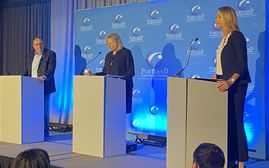LePage reports record state surplus as Maine begins new fiscal year
 Courtesy / Matthew Gagnon, Wikimedia Commons
Gov. Paul R. LePage reported Monday that the state concluded fiscal year 2018, which ended on June 30, with an unappropriated surplus of $175.8 million.
Courtesy / Matthew Gagnon, Wikimedia Commons
Gov. Paul R. LePage reported Monday that the state concluded fiscal year 2018, which ended on June 30, with an unappropriated surplus of $175.8 million.
Gov. Paul R. LePage reported Monday that the state concluded fiscal year 2018, which ended on June 30, with an unappropriated surplus of $175.8 million.
The governor’s office reported that commitments from this balance included:
- $74.6 million carried forward as part of fiscal year 2019 budget;
- $350,000 to restore the governor’s contingent account;
- $1 million to the Loan Insurance Reserve Fund;
- $2.5 million to the Reserve for General Fund Operating Capital;
- $2 million to reduce the Unfunded Actuarial Liability in the Retiree Health Insurance Fund.
In addition to these payments, State Controller Douglas Cotnoir issued final priority reserve transfers to both the Budget Stabilization Fund and Tax Relief Fund for Maine Residents. The funds received transfers of $76.2 million and $19.1 million, respectively.
“Over the course of the last seven and a half years, our administration has been committed to a multi-year strategy of major structural reforms for state budgeting and fiscal management,” said LePage said in a news release announcing the year-end surplus. “Our philosophy is simple: Mainers expect a government that can live within its means. Today’s news reinforces the success of that philosophy and will provide my successor with the ability to focus on making investments in the future of our state rather than filling budget gaps.”
Healthy balance in ‘budget stabilization fund’
The current balance of the state’s budget stabilization fund is $272.9 million, while the Reserve for Tax Relief stands at $28.4 million. The Reserve for Operating Capital, which received $2.5 million, has a current balance of $14.9 million.
In all, the state carried financial reserves totaling $316.2 million into the new fiscal year.
“Maine’s cash position is healthy and at historic highs,” LePage stated. “Our tax reductions and reforms have been enacted responsibly, proving that cutting taxes — while controlling expenditures — can allow Mainers to keep more of their hard-earned money while still providing essential services and saving for an economic downturn.”
Statements from Democratic leaders
Speaker of the House Sara Gideon, D-Freeport, released the following statement about the state's year-end financial report:
“I’m enormously pleased that Maine continues to show strong revenue growth as we continue our slow recovery from the recession. Because our revenues continue to exceed projections, we can finally focus on long-term solutions that strengthen middle class families, while creating an environment that supports good paying jobs and a strong economy. The state has achieved these results in spite of a challenging and unpredictable environment created by this administration. They are due to the hard work of the Legislature, who for the past three sessions have crafted budgets that made significant investments in education, expanded property tax relief for middle class Mainers, invested in those that care for our seniors and Mainers with disabilities, all while rejecting devastating cuts to essential government services.”
Rep. Drew Gattine, D-Westbrook, House chairman of the Appropriations and Financial Affairs Committee, said in a statement the increase in revenue resulting in the surplus “reflects strong economic growth, but it also presents real opportunity to address the vital needs of Maine families.”
“In March we received a revenue forecast that projected $129 million in new revenue. In just four months, we have seen overall revenues exceed that by nearly $100 million,” he said. “That’s great news because it is now crystal clear that we have the resources to help Maine people live better lives. It also means there is no excuse for delaying expansion of Medicaid, which will inject another $500 million into Maine’s economy and provide life-saving health care to over 70,000 who desperately need it.”
After LePage vetoed a $60 million funding bill that would have implemented the Medicaid expansion, the House of Representatives’ 85-58 vote on July 9 fell short of the two-thirds majority needed override his veto.














Comments